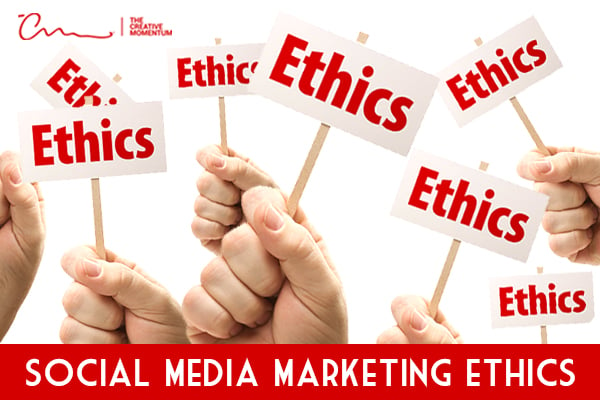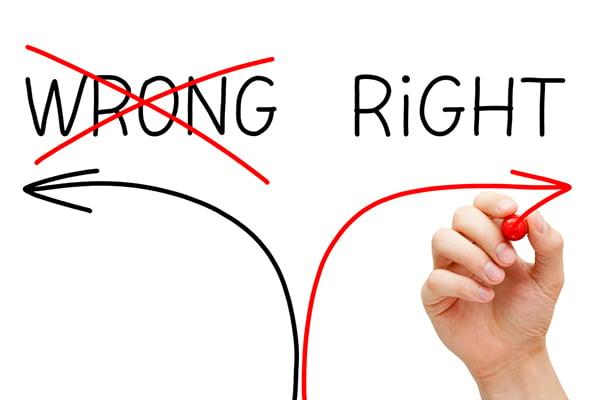
Social media is here to stay, and has invited continuous conversations about social media marketing ethics almost since its inception. As a result, marketers continuously adjust strategies and tactics within social media platforms.
As is the case with most marketing avenues, digital marketing is not immune to unsavory practices. Social media marketing ethics challenge both marketers and consumers as platforms continue to grow.
These marketing ethics can determine how customers see your business. Ethical issues like data privacy, bias, and transparency are important to consider when crafting your social media marketing campaigns.
Understanding the Ethics
Business ethics are a foundation upon which companies build their reputation. A company’s ethics establish trust between customer and company. If you are transparent about your ethical practices, customers will notice. It’s that simple.
Ethics, in general, pertain to moral principles and a shared concept of what is “right” and what is “wrong.” Social media marketing ethics, as a result, are not a rigid set of musts that businesses have to follow. Instead, they’re an unwritten code of conduct.
Deceiving customers to achieve financial gain is ethically wrong. On the other hand, establishing trust through honest interactions is an ethical gain, and is more likely to lead you to financial gain as well.
It’s crucial—especially in today’s landscape of social accountability—that you practice admirable marketing ethics.
4 Tips for Ethical Social Media Marketing

Marketing ethics are pretty simple on the surface: don’t lie, don’t cheat, and don’t exploit people. Ethical choices you’d make for traditional marketing campaigns also apply to social media ones.
The difference is that social media marketing often has a wider, more immediate impact. What you presumed was an innocent post could go viral, and you have to deal with the fallout. That’s why it’s helpful to follow these tips for ethical social media marketing.
1. Be Honest
- Don’t lie in your social media marketing. This is as simple as telling the truth about your product or service. Honesty extends to your brand personality and the way you communicate with customers.
- You create doubt and mistrust when you’re disingenuous. Don’t exaggerate what you can offer, and don’t distort information. Instead, be honest about the value and usefulness of your product or service.
2. Be Transparent
- Transparency in social media marketing is a must. The motives behind your marketing don’t have to be overstated and obvious, but don’t try to hide your intentions behind crafty content.
- It’s easy to find environmental, business, and political affiliations in the digital era. Consumers are quick to judge companies based on their alignment with ethical and moral issues. Be transparent about your affiliations whenever you can.
3. Don’t Exploit Emotions
- Some might say that swaying emotions to motivate action is the underlying art of marketing. Those people wouldn’t be wrong. That said, there’s a line between appealing to emotional factors and exploiting emotions for your own gain.
- Hot button issues and times of distress are not opportune moments to promote your product. Think back to the Pepsi/Kendall Jenner ad from 2017. Obvious attempts to take advantage of emotions may get called out and exploited for all the wrong reasons. Don’t do it.
4. Don’t Compromise Data
- Compromised data and online data security is a touchy subject. On one hand, companies have been buying user data for decades to fine tune marketing campaigns and better reach their audiences. On the other hand, from a consumer perspective, it doesn’t seem fair to have your data sold to companies without your knowledge.
- Buying and using user data to fuel your social media marketing campaigns is an ethical gray area. Instead, try to build your audience and followers organically so that you can market to folks who've opted-in to sharing their data so that they can learn more about your business.
- And, it should go without saying, never reveal or exploit personal data through social media. That’s very bad business ethics.
Ethical social media marketing is a far-reaching, nuanced topic. Being honest and transparent and not exploiting people’s emotions or data is only the tip of the iceberg. It’s a good place to start when considering your own company’s social media campaigns.
Examples of Bad Social Media Marketing Mistakes

Still not sure what bad social media marketing ethics look like? Fortunately, plenty of companies have tread those waters before you, and it’s easy to learn from their mistakes.
Cheerios and Prince’s death – Following the musician’s death in 2016, Cheerios thought it was a good idea to tie their brand to Prince’s passing. The company tweeted a purple “Rest in peace” image with their circle cereal replacing the dot in the word “in.” Fans and customers were not happy.
Dove and race transformation – Dove saw success with body positivity campaigns focused on acceptance and beauty, so it was surprising when a social media ad featured a woman of color turning into a white woman after using Dove lotion.
Both of these examples were missteps by companies that generally have an ethical approach to their marketing. This shows how easy it can be to misread the digital room and negatively position your brand through social media.
Examples of Great Social Media Marketing Wins

There are just as many examples of social media marketing with a finger on the ethical pulse. This is done when marketers realize a company’s product or service can be used for good during a time of need. Airbnb and Netflix are two examples of good ethical social media marketing during the recent pandemic.
Airbnb helps house COVID-19 Responders - Airbnb is uniquely positioned to connect hosts and 100,000 COVID-19 responders in need of temporary lodging during the pandemic, and that’s exactly what they promoted through a recent social media campaign. The company aimed to provide free or subsidized lodging and did not exploit the situation.
Netflix connects people with mental health experts – Netflix took to social media in an ethical way during the pandemic. Their recent “Wanna Talk About It?” campaign was a partnership with Instagram to showcase content and discussions with trusted mental health experts.
Ethical Marketing is the Future
It’s really quite simple to manage your social media marketing from an ethical perspective.
What’s more, consumers connect with businesses that practice ethical marketing. Brands are able to get more involved in people’s lives, and consumers want to do the same with brands they can trust. There are no downsides to practicing ethical social media marketing, but it does require that you take the time to be thoughtful and invite others' perspectives along the way.


